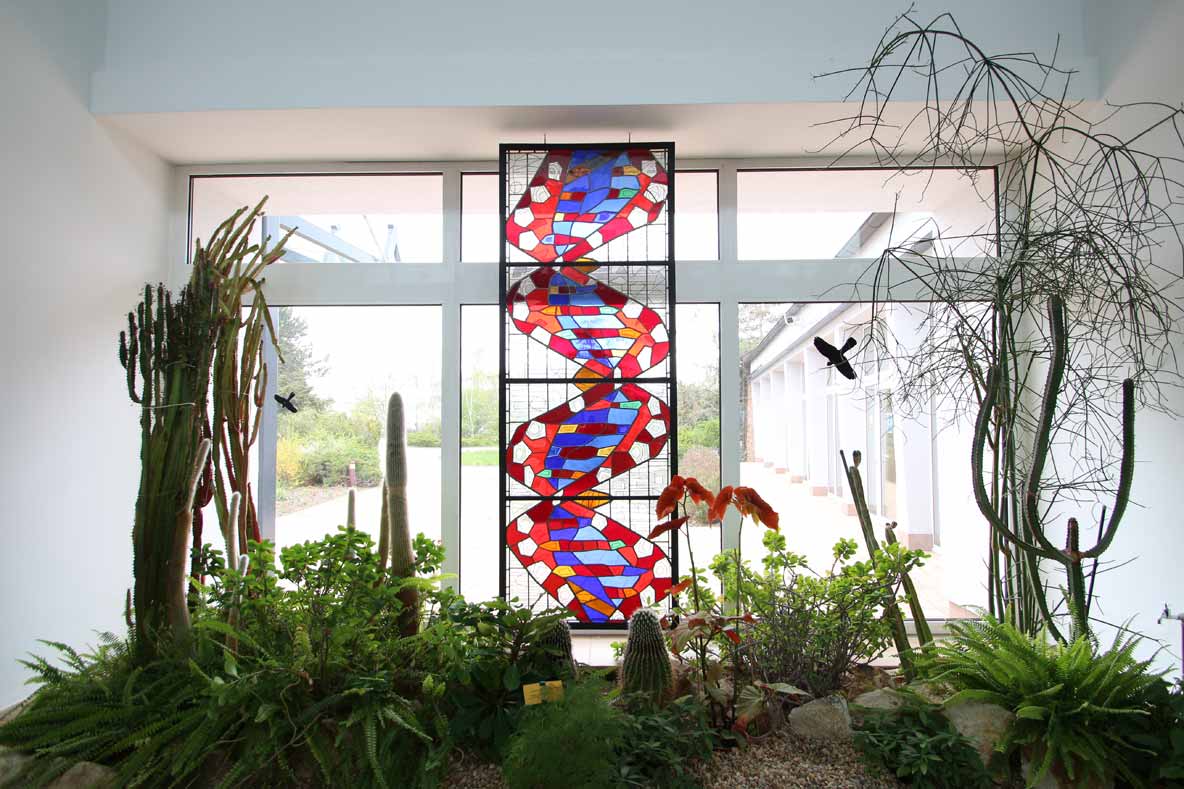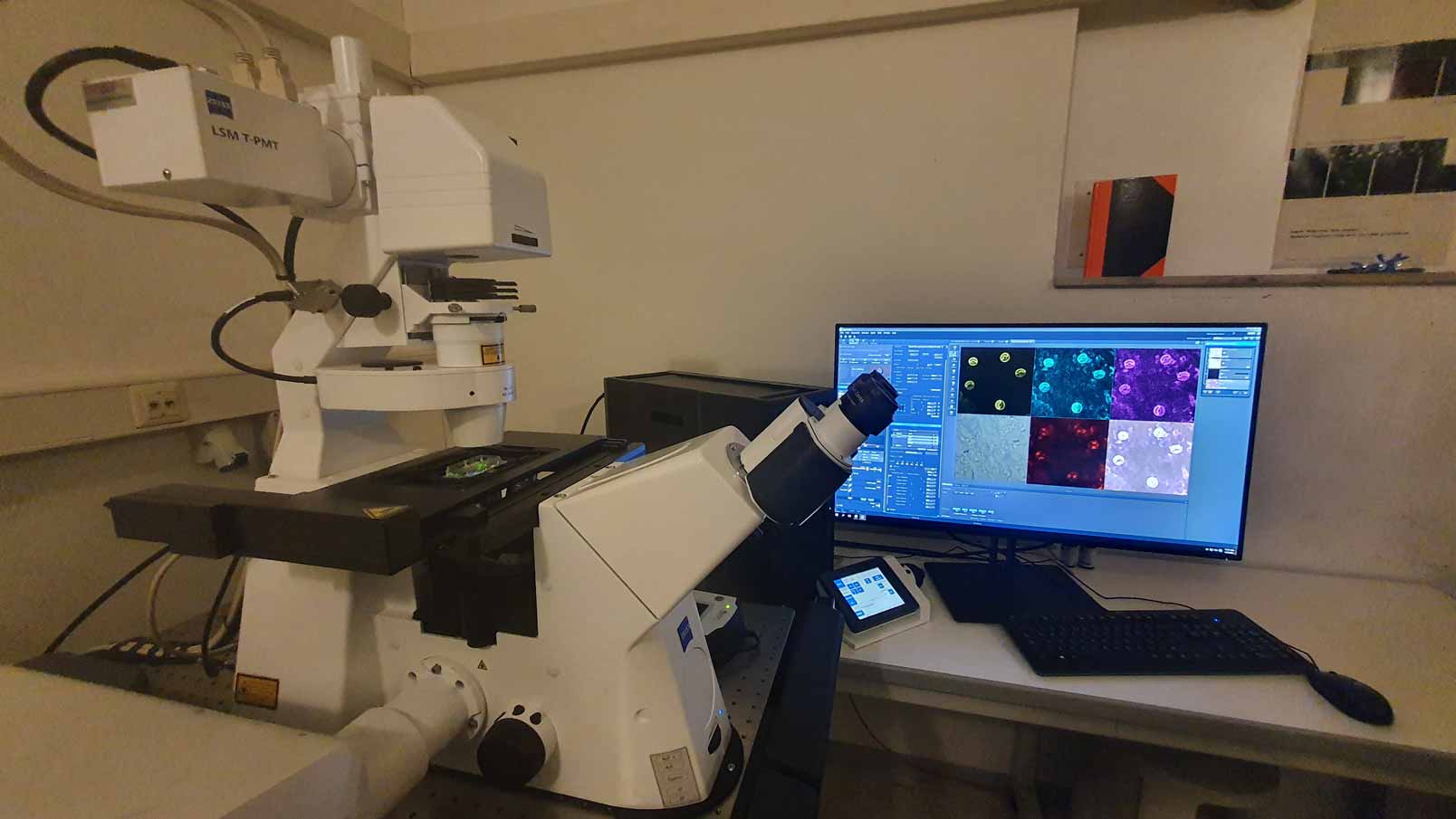„Fascinating and beautiful“
They provide oxygen and food and create a healthy environment: plants are vital and yet increasingly threatened. Professor Tina Romeis at the Leibniz Institute of Plant Biochemistry (IPB) in Halle is researching how their resistance to drought and other stress factors can be specifically improved.
Professor Romeis, climate change is affecting plants worldwide. Even in our latitudes, trees, shrubs and many other plants have been affected by the droughts of recent years. Does this concern you in your research?
Yes, drought stress is a major issue for me and many of my colleagues here at the institute. As basic researchers, we want to understand down to the molecular details what happens in plants during prolonged water shortages. With this knowledge, it should be possible to increase their resistance in a targeted way.
How are you tackling the problem?
Our institute specializes in small molecules. We focus on certain metabolites that make a decisive contribution to a plant’s resistance to drought. We determine such metabolites in plants that cope differently well with water shortages. Trees such as beech and oak still have a fairly high drought tolerance, while conifers have major problems. We also identify the small molecules in signaling pathways that spread information about environmental conditions within a plant. The plant also uses these pathways to mobilize its defenses, for example in the event of water shortage.

© IPB
In the foyer of the Leibniz Institute of Plant Biochemistry (IPB) in Halle.
How can we imagine plant defenses?
When plants are attacked, for example by bacteria or feeding insects, they activate defense mechanisms and substances with which they can defend themselves against future attacks. Calcium-dependent protein kinases are involved in this, and I am particularly interested in them in my research. These are enzymes that are not only important for the immune defense of plants, they also shape plant stress tolerance to drought, cold and nutrient deficiency. Interestingly, there are similar calcium-regulated protein kinases in the human brain that are critical for learning and memory.
Can plants also remember?
Yes, you can certainly say that. Of course, plants don’t have a brain or nervous system like we humans do. But they do have a kind of molecular memory. My research group is investigating exactly how it works, what information plants store in the short or long term, and what factors regulate the forgetting of information.
What do you do with findings that could be interesting for application?
If that’s the case, we turn to the Leibniz Institute of Plant Genetics and Crop Plant Research in nearby Gatersleben. The exchange and cooperation between our institutes works excellently and the division of roles is mutually agreed: We at the IPB are responsible for basic biochemical research, while Gatersleben has species-rich seed banks that are ideally suited for new breeding or targeted genetic modification.
Such developments are very important for feeding a growing world population under climate change. Does this have an impact on your work?
Admittedly, we do not carry out plant breeding, so we do not provide directly applicable solutions. But the questions we ask in our basic biochemical research are naturally guided by global challenges such as climate change. The fact that these research questions urgently need to be answered is also evident from the fact that science in our field is booming worldwide. In Germany, we are currently still in a very good position. However, I am somewhat skeptical about the future. Many young people don’t want to do a doctorate after graduation. Among them, I observe a strong interest in nature conservation, environmental management and ecological education – basic research is not their main concern.
Was that the reason why you moved from Freie Universität Berlin to the Leibniz Research Institute in Halle three years ago?
I wanted to concentrate on research, and the conditions at the IPB are ideal for that. The equipment we have here is something you can only dream of at most universities. One example is our mass spectrometer, which we use to determine the masses of atoms and molecules in plants, another is the confocal microscope, which makes tiny plant reactions visible. And with the help of so-called FRET microscopy, we can observe biochemical processes in the plant live.

© IPB
With this confocal microscope, the scientists led by Professor Romeis study the behaviour of living plants under different conditions, such as severe drought. The image tiles on the screen show the same leaf of the thale cress Arabidopsis thaliana, which is frequently used for research purposes. Individual sphincter cells (stomata) on the underside of a leaf are shown – they control the gas exchange and water balance in the plant. The microscope demonstrates the biochemical processes that lead to the opening of the cells in favourable conditions and to their closing in dry conditions.
These sound like good prerequisites for success stories.
And there are always success stories, even across disciplines. Just a few months ago, a spectacular discovery was published to which research at our institute contributed. It was about the trigger of a mysterious neurodegenerative disease in bald eagles, which was identified after years of joint research with American scientists. Since the 1990s, the disease had killed many birds, reptiles and fish in the southern United States. The cause was a toxin produced by cyanobacteria that thrive on certain aquatic plants in the affected areas. The study was published as a cover story in the journal “Science” and brought large reputation to plant research in Halle. My colleagues at the institute have now just succeeded in the total chemical synthesis of this toxin, which is a toxic metabolite.
The study was also reported in the German media. Was that due to the attractive topic or is public interest in scientific topics generally high?
It had a lot to do with the particular subject matter. In general, I’m observing an increasing scientific fatigue and a loss of confidence. The many plagiarism scandals have done a lot of damage to the relationship between science and society. We have a lot of catching up to do.
What role can the GDNÄ play in this? After all, the exchange with society is one of its major concerns.
I believe that the GDNÄ can achieve a lot here. It is a neutral body and does not represent any specific professional interests. That is a good basis for a trusting dialog with the public.
In the GDNÄ, you have recently started representing the subject of biology. What would you like to achieve in this function?
Plants are extremely important for our lives, for energy supply and the entire ecosystem, and they are becoming increasingly important. In addition, plants are beautiful and fascinating. I would like to raise awareness of that and also communicate it to the next generation. The GDNÄ’s programs for students and teachers offer excellent opportunities for this.

© IPB

© IPB
About the person
Since 2019, Tina Romeis has headed the “Biochemistry of Plant Interactions” department at the Leibniz Institute of Plant Biochemistry (IPB) in Halle an der Saale. At the same time, the then 54-year-old was appointed professor at Martin Luther University Halle-Wittenberg. Prior to this, Tina Romeis had headed the Department of Plant Biochemistry at Freie Universität Berlin for 15 years. The call to Berlin was preceded by research activities at the Max Planck Institute for Plant Breeding Research in Cologne, Germany. There she was able to establish herself as an independent group leader thanks to the highly endowed Sofia Kovalevskaja Award of the Alexander von Humboldt Foundation, which she received in 2001. Her habilitation in genetics and molecular phytopathology took place at the Institute of Genetics of the Ludwig-Maximilians-University of Munich. Further milestones in her career were research residencies in Munich and at the John Innes Centre in Norwich, UK, and before that a PhD at the Max Planck Institute for Developmental Biology in Tübingen. In Tübingen, at the Eberhard Karls University, Tina Romeis studied biochemistry, organic chemistry and plant physiology. Born in Würzburg, she grew up in the Steigerwald region of Franconia.
Professor Romeis’ research interests focus in particular on calcium-dependent protein kinases. These enzymes are not only important for the immune defense of plants, they also shape their stress tolerance to drought, cold and nutrient deficiency. The biochemist wants to make her basic research useful in cooperation with research institutions in the region: both for agriculture and forestry as well as for understanding ecological relationships.
Further links:
